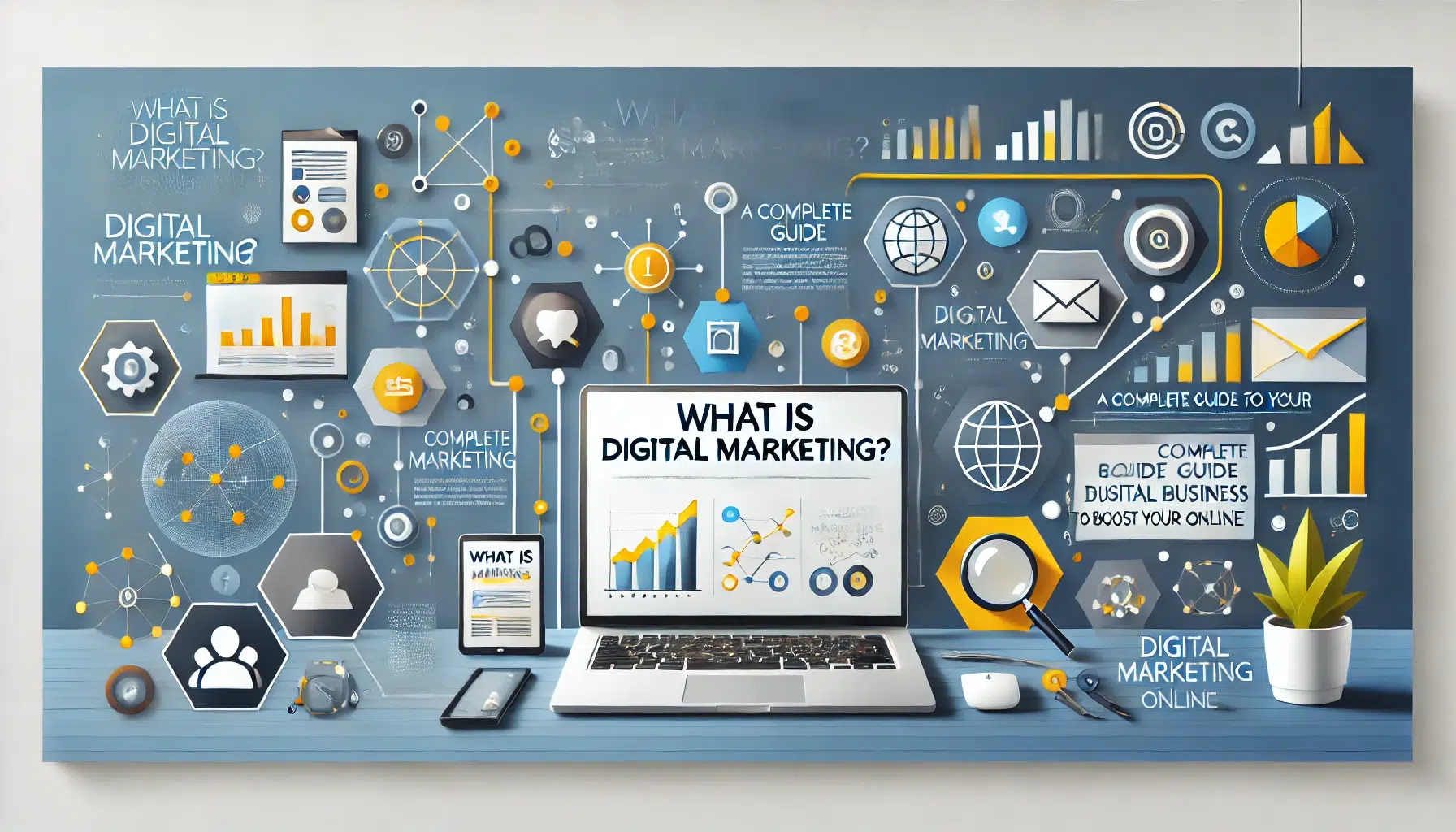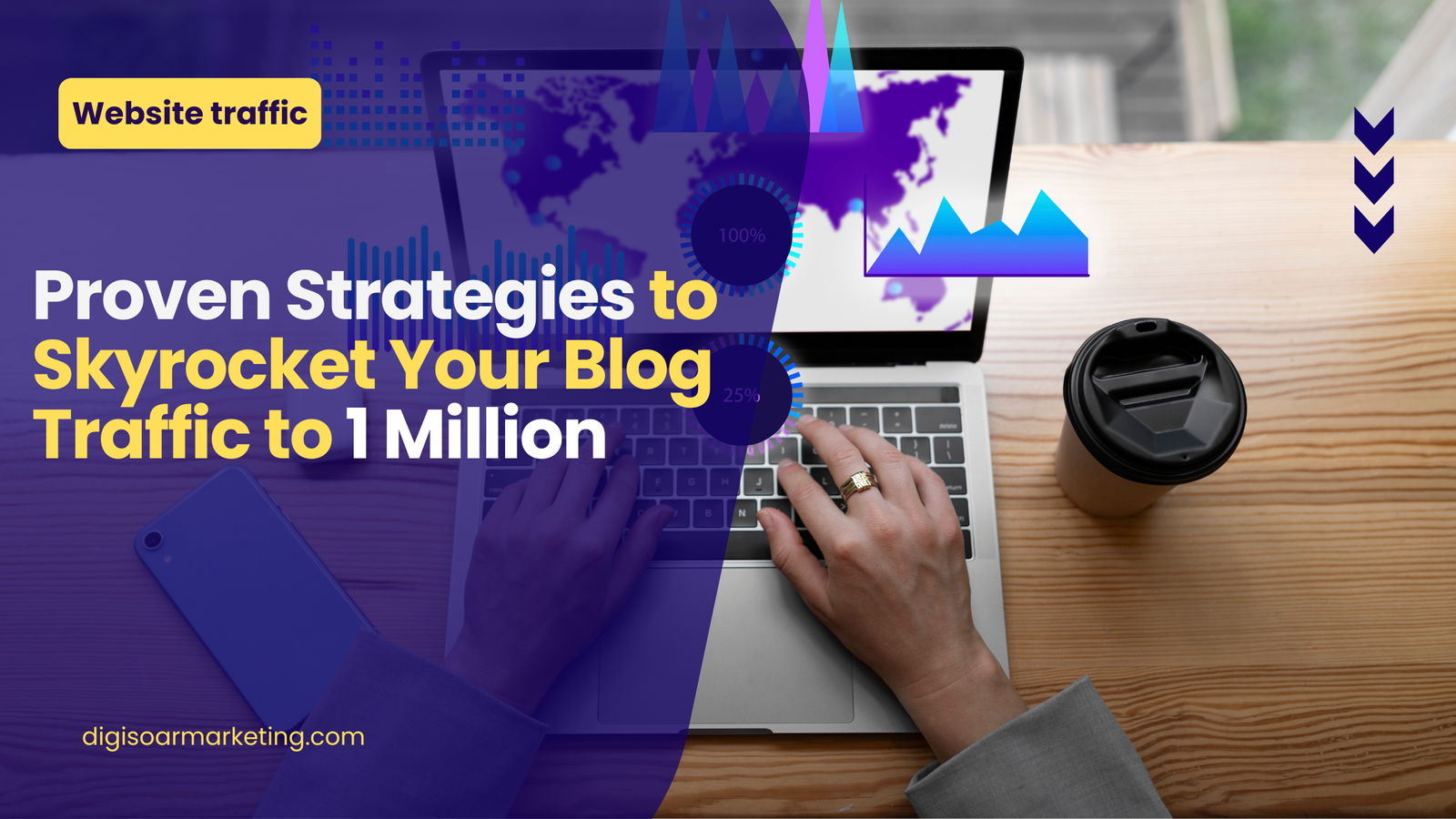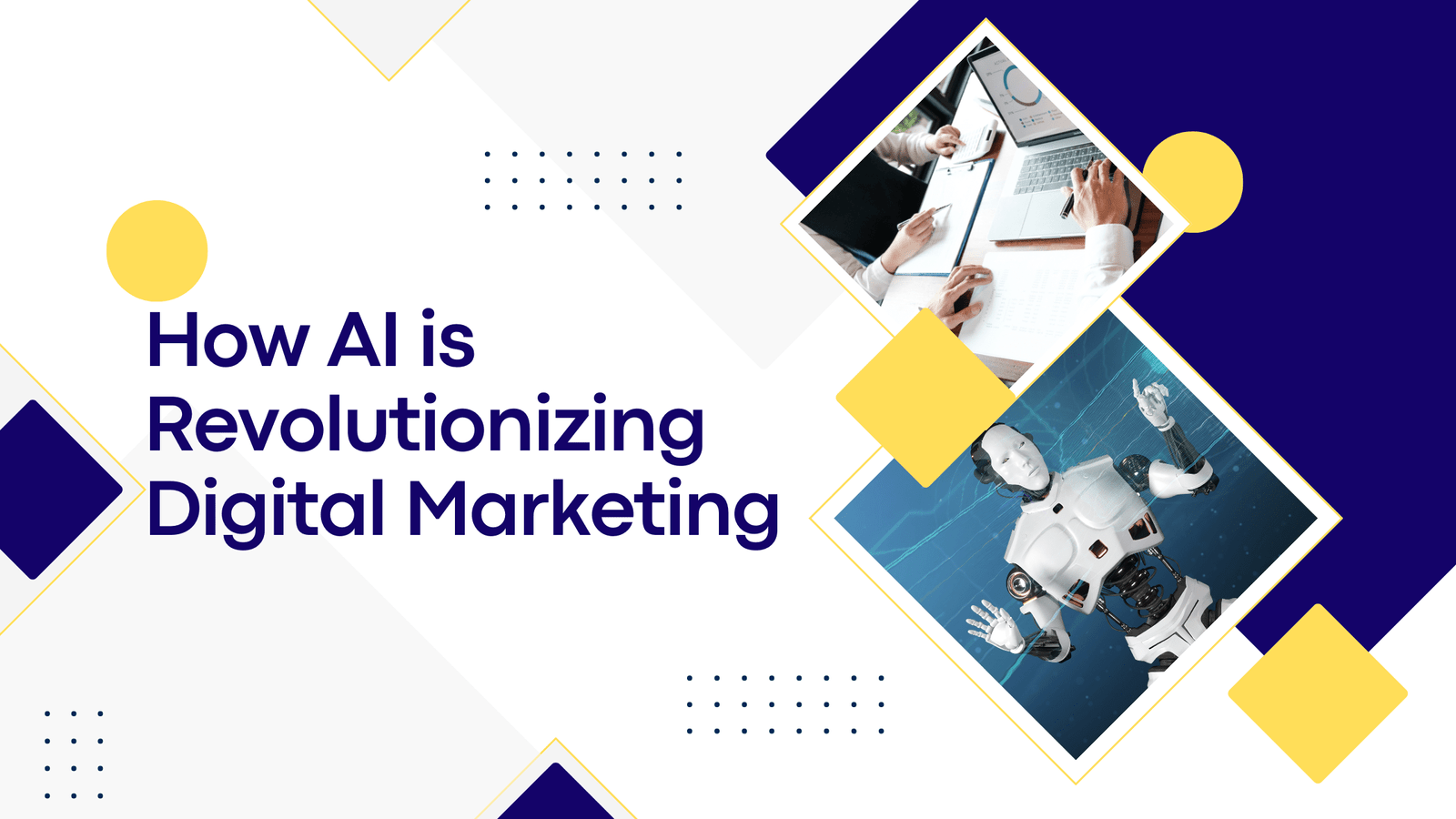Introduction
Do you remember the days when businesses reached their customers through ads in newspapers, radio, or TV commercials? The world has changed drastically since then. Today, most consumers are online, constantly connected through social media, search engines, emails, and mobile apps. As a result, businesses have shifted their focus from traditional marketing to digital marketing, where the opportunities are endless.
But what exactly is digital marketing, and why is it so crucial for businesses today?
In this detailed guide, we’ll walk you through what digital marketing is, explain why it’s essential for every business, and discuss some key strategies to help you boost your business online. Whether you’re a small startup or a large corporation, digital marketing can help you reach your audience more effectively, build stronger relationships, and grow your business faster.
Table of Contents
What is Digital Marketing?
Digital marketing is the practice of promoting products, services, or brands through digital channels such as websites, search engines, social media, email, and mobile apps. Unlike traditional marketing methods that rely on print or TV ads, digital marketing uses online platforms to connect with customers in real-time. It’s an umbrella term that covers a range of strategies, from search engine optimization (SEO) and content marketing to pay-per-click (PPC) advertising and social media engagement.
In essence, digital marketing helps businesses meet their customers where they already are — online. This gives companies a unique opportunity to engage with customers through targeted, personalized experiences.
Why is Digital Marketing Important?
Digital marketing is no longer a luxury — it’s a necessity for businesses that want to succeed in today’s competitive landscape. Here’s why:
1. Wider Reach and Accessibility
One of the most significant advantages of digital marketing is its ability to reach a global audience. Unlike traditional marketing, where your reach might be limited to a specific geographic area, digital marketing opens the doors to customers from around the world.
Imagine running a small local business, but with a well-executed digital marketing strategy, you’re able to attract customers from different countries. Through a website, social media platforms, or even an email campaign, your business becomes accessible to anyone with an internet connection.
2. Measurable Results with Data Analytics
How can you be sure that your marketing efforts are paying off? With traditional methods like billboards or newspaper ads, it’s challenging to measure success. However, digital marketing offers real-time data on your campaigns.
Tools like Google Analytics, Facebook Insights, and other tracking software allow businesses to see how many people viewed their content, clicked on their ads, or made a purchase. This data is invaluable for refining marketing strategies and improving overall performance.
By measuring metrics like traffic, conversions, and customer behavior, businesses can optimize their campaigns to be more effective and ensure they’re getting the best return on investment (ROI).
3. Cost-Effective Solutions
Compared to traditional marketing, digital marketing is often more affordable. Print ads, TV spots, or billboards can be costly and don’t always provide measurable results. In contrast, digital advertising platforms like Google Ads, Facebook Ads, and Instagram Ads offer flexible pricing models, where you only pay when someone clicks on your ad.
Small businesses, in particular, benefit from digital marketing’s cost-effectiveness. With careful targeting and budget control, they can reach their target audience without breaking the bank, making digital marketing accessible even to those with limited resources.
4. Personalization and Engagement
Digital marketing allows businesses to create personalized experiences for their customers. Unlike traditional ads that target everyone, digital platforms use data to ensure that marketing messages are shown only to people who are likely to be interested in your products or services.
For example, you can send personalized emails to your customers based on their past purchases or interactions with your website. This kind of tailored approach not only improves engagement but also builds trust and fosters loyalty among customers.
Key Digital Marketing Strategies to Boost Your Business
Now that you understand the importance of digital marketing, let’s explore some of the most effective strategies that can help you grow your business online.
1. Search Engine Optimization (SEO)
Search Engine Optimization (SEO) is the process of optimizing your website so that it ranks higher in search engine results for specific keywords. The higher your website ranks on Google or Bing, the more likely people are to find your business.
Why SEO Matters:
- SEO drives organic traffic, which means people find your website naturally through search engines without you having to pay for ads.
- Higher rankings can lead to increased credibility and trust, as customers tend to click on the top results.
SEO Tips:
- Use relevant keywords throughout your website’s content.
- Ensure your site is mobile-friendly and loads quickly.
- Create high-quality, informative content that answers your audience’s questions.
- Build backlinks from reputable websites to boost your site’s authority.
2. Pay-Per-Click (PPC) Advertising
Pay-Per-Click (PPC) advertising allows businesses to pay for their ads to appear at the top of search engine results or on social media platforms. The key advantage of PPC is that you only pay when someone clicks on your ad, making it a highly cost-effective strategy.
Why PPC Matters:
- PPC provides immediate visibility, making it a great way to drive traffic quickly while you work on your long-term SEO strategy.
- You can target specific keywords, locations, and audiences, ensuring your ads reach the right people.
PPC Tips:
- Choose relevant keywords with a good balance of search volume and competition.
- Continuously monitor and adjust your campaigns based on performance.
- Set daily or weekly budgets to avoid overspending.
3. Social Media Marketing
Social media marketing is one of the most powerful ways to engage with your audience directly. Platforms like Facebook, Instagram, Twitter, LinkedIn, and TikTok provide businesses with the tools to share content, run ads, and interact with customers in real-time.
Why Social Media Matters:
- It allows you to build relationships with your audience and create a loyal community around your brand.
- Social media platforms offer a range of advertising options that allow you to target specific demographics, interests, and even behaviors.
Social Media Tips:
- Post regularly and engage with your followers by responding to comments and messages.
- Share a mix of content, from educational blog posts to behind-the-scenes videos, to keep your audience interested.
- Run targeted ads to promote products or special offers.
4. Content Marketing
Content marketing is the strategy of creating and sharing valuable content to attract and retain an audience. This includes blog posts (like this one), videos, infographics, podcasts, and social media posts. Instead of directly promoting your product, content marketing focuses on educating and engaging your audience.
Why Content Marketing Matters:
- Quality content builds trust and authority in your industry.
- Content marketing supports other digital strategies like SEO and social media marketing by providing valuable information that your audience is actively searching for.
Content Marketing Tips:
- Focus on providing value to your audience, rather than just promoting your products.
- Create a content calendar to ensure consistency in publishing.
- Mix up your content formats (videos, blogs, infographics) to keep things interesting.
5. Email Marketing
Email marketing is still one of the most effective ways to nurture customer relationships and drive conversions. By sending targeted emails to your audience, you can build a direct line of communication and promote your products or services.
Why Email Marketing Matters:
- It allows for personalized communication, such as sending tailored offers based on a customer’s behavior or past purchases.
- Email marketing consistently delivers a high ROI compared to other digital marketing channels.
Email Marketing Tips:
- Build a segmented email list to target different groups based on their interests or purchasing history.
- Personalize your emails by addressing the recipient by name and offering relevant content.
- Use clear calls-to-action (CTAs) to encourage readers to take action, such as making a purchase or signing up for a webinar.
Real-World Examples of Successful Digital Marketing Campaigns
Several businesses have made a significant impact through creative digital marketing campaigns. Here are a few inspiring examples:
Coca-Cola’s “Share a Coke” Campaign: Coca-Cola added people’s names to their bottles, encouraging customers to share photos on social media. This simple yet personal campaign created a viral buzz and led to massive engagement online.
Nike’s “Just Do It” Campaign: Nike used motivational content across digital platforms to inspire customers to take action. Their slogan became universally recognized, thanks to consistent messaging and inspirational content.
Dollar Shave Club: This startup went viral with a funny, relatable YouTube video that highlighted their product and brand personality. The campaign was a huge success, leading to millions of views and a surge in customer sign-ups.
Conclusion
Digital marketing is a game-changer for businesses of all sizes. It’s a powerful tool that can help you reach a global audience, measure your success, optimize your strategies, and build meaningful relationships with customers. By leveraging strategies like SEO, PPC, social media marketing, content marketing, and email marketing, your business can thrive in the digital world.
Frequently Asked Questions
Digital marketing includes several strategies like SEO, PPC, content marketing, social media, and email marketing. Each component targets specific parts of the customer journey, and together, they create a cohesive approach to attract, engage, and convert customers.
Small businesses can benefit by focusing on cost-effective strategies like social media marketing, SEO, and email marketing. These methods help build brand visibility and customer engagement without requiring a large budget.
The timeline for results varies by strategy. SEO may take a few months to show results, while PPC advertising can yield immediate traffic. Generally, consistent efforts lead to sustainable results within three to six months.
Organic digital marketing, like SEO and content marketing, involves unpaid methods to attract traffic. Paid marketing, like PPC ads, requires businesses to pay for visibility, often resulting in quicker but temporary traffic increases.
Success can be measured using analytics tools like Google Analytics and Facebook Insights, focusing on metrics such as website traffic, conversion rates, engagement rates, and return on investment (ROI). Regularly monitoring these metrics helps optimize campaigns for better results.



